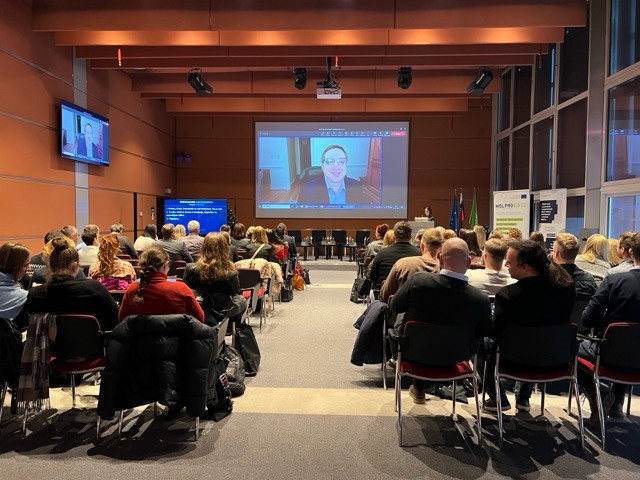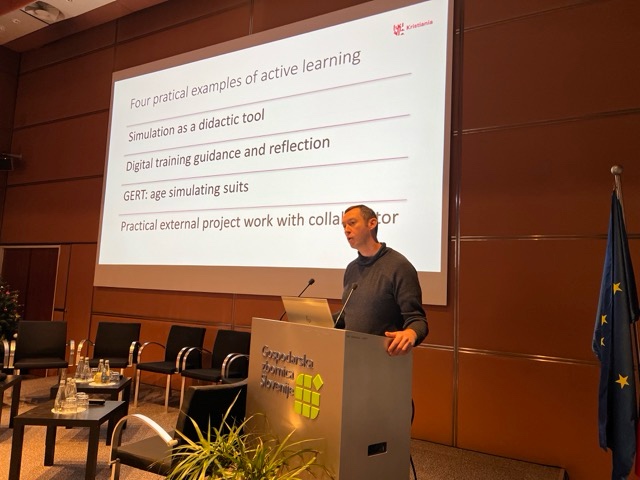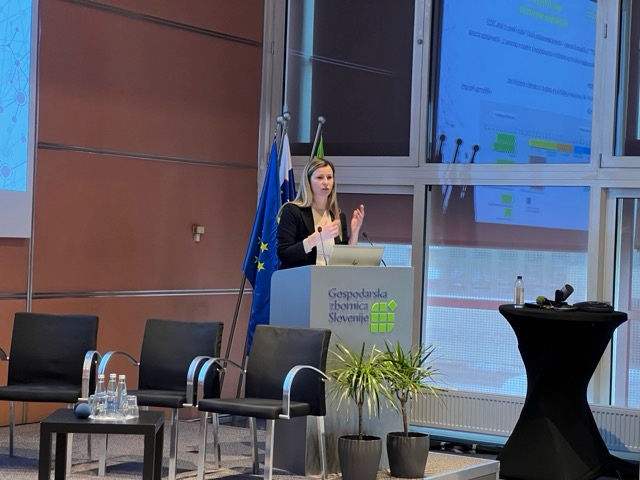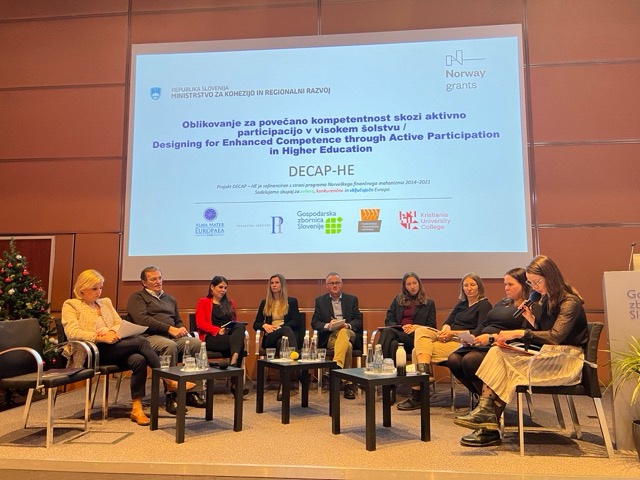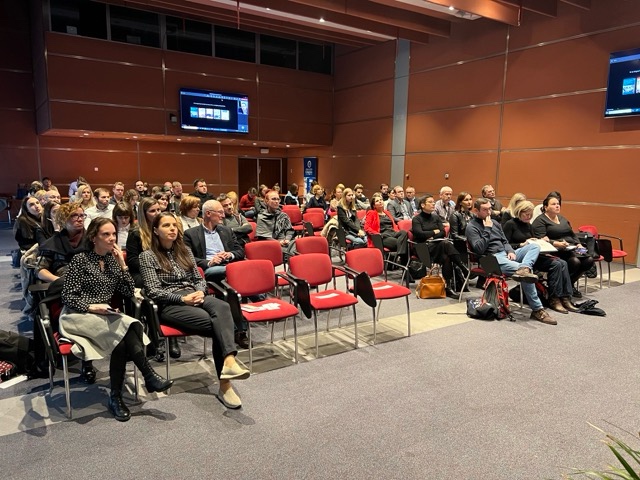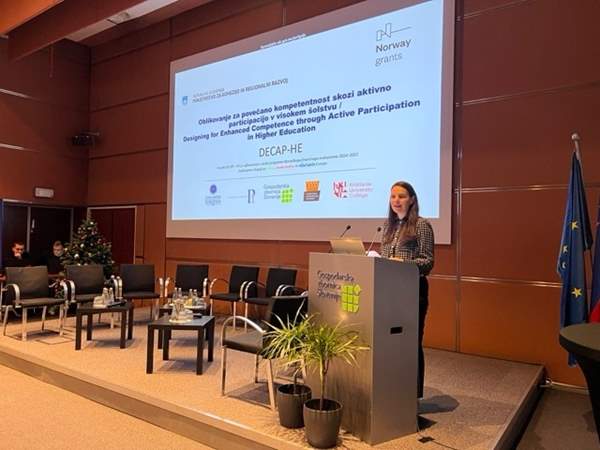
The economy needs a flexible education system
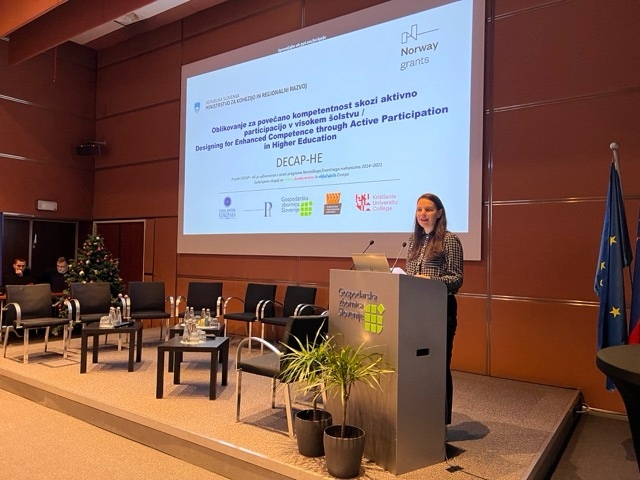
The leading partner in the DECAP-HE project, Alma Mater Europaea – ECM, in cooperation with the Chamber of Commerce of Slovenia, the Pedagogical Institute, the Student Organization of Slovenia, and Kristiania University College in Ljubljana, held the professional event Education and the Economy in a Common Vision.
The connection between the educational sphere and the economy is crucial for developing society and the individual. Improving the relationship between education and the economy brings double benefits: Young people will be better prepared to enter the labor market, and companies will have easier access to appropriately qualified personnel. This cooperation promotes innovation and contributes to the sustainable development of society.
"The activities and content we present come from many individuals' vision, dedication, and hard work. They result from cooperation, strategic planning, and commitment to a common goal. Every project represents a challenge but at the same time, an opportunity for growth and innovation. Together, we can overcome any challenge and achieve the highest goals. Our economy needs us. A flexible school system is needed so that we can quickly adapt to rapid changes and thus become more and more competitive in the region and beyond," pointed out the head of the DECAP-HE project at Alma Mater Europaea, Dr Polonca Pangrčič.
Todd Zakrajšek from the University of North Carolina in the USA highlighted in a lecture on the use of learning science for active learning: "Research findings in higher education consistently demonstrate that students who receive knowledge through a combination of active learning strategies and lectures show greater learning gains than in courses that only include lectures."
The lecture by Lars Erik Braaum from Kristiania University College, Norway, focused on work-based learning and active learning in higher education. "For us as a university, the central goal is to equip students with the skills to perform their profession immediately. Integrated learning is a tool that can be used to fulfill the common interest of employers and employees and is based on the fact that students demonstrate more than just knowledge; they must also have skills and competencies."
Katia Štefanić, project manager at the Cooperative Center for Social Activities in Trieste, presented an overview of the system of practical training with work (Alternanza scuola-lavoro) in the Italian context and the resulting development of conceptual designs for project cooperation in this area in a cross-border and international context.
"The need for an upgraded, personalized approach to delivering hands-on, on-the-job training and simplifying it through digitization proved to be a logical step forward. With partners and students, teachers and employers from Italy, Slovenia, Austria, Ireland, Spain, Hungary, and Serbia, we developed the digital platform inpraxi.online, which unites all actors in the process of practical training with work and supports its users before, during, and after work practice," said Katia Štefanić.
The expert meeting continued with a round table entitled "How to connect education and the economy effectively." "At the round table, we touched on various topics, such as how schools and colleges can better prepare pupils and students for the labor market. We discussed active learning methods and the importance of global competencies in education. We were interested in the challenges and opportunities for better integration of education and the economy and examples of good practice from Slovenia and abroad," summarized Marike Grubar, President of the Student Organization of Slovenia.
Vesna Miloševič Zupančič, the expert manager of the e-Student Service, has pointed out that Generation Z is slightly different from previous generations. This difference is understandable, considering that their phones and computers have been in their lives since their early years. Zupančič states, "They desire relevant work experience even during internships and student work. They actively seek job opportunities that align with their field of study, as these provide crucial competencies, knowledge, and potential for regular employment. Upon entering the workforce, they expect flexibility, hybrid work options, a clear progression plan, and opportunities for career growth. Additionally, they desire to be accepted, heard, and provided with feedback, induction, and mentoring. Young individuals prioritize fair compensation, work-life balance, environmental concerns, and mental health."
Julija Pirnat from the Employment Agency of the Republic of Slovenia firmly believes that gaining experience through student work, voluntary work, and internships is paramount. Such experiences assist young people in making significant decisions regarding their future career paths.
In the discussion participated: the vice-dean and head of the department of the Institute of Psychology, Pedagogy, and Law at Kristiania University Collage Hilde Skjerve; representative of the Ministry of Higher Education, Science, and Innovation Mojmir Flisek; representative of the Center for Vocational Education Darko Mali; member of the DOS Presidency and the president of the Committee for Culture, Sports and Extracurricular Activities, Hana Kolendo; and the project manager of the Cooperative Center for Social Activities in Trieste, Katia Štefanić.
The interlocutors agreed that integrating education and the economy is crucial for the future development of society.


